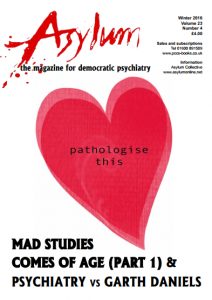This issue and the next (March 2017) are mainly given over to highlighting new and original work around the theme of Mad Studies. We wanted to share our collective enthusiasm about this new project with Asylum readers. Mad Studies can be seen as both a continuation and a new phase of radical scholarship and activism in mental health.

We were specifically inspired by the second Mad Studies stream at the Lancaster Disability Studies conference in September this year. While the first Mad studies stream in 2014 arguably kicked-off Mad Studies in the UK, it felt a bit tentative and cautious. This year it seemed bolder and stronger.
- By the final session there was a real sense that Mad Studies had come of age. There were a number of reasons for this:
- The emergence of new Mad scholars developing Mad-centred experiential-based knowledge, including those experiences that don’t ‘ft’ the usual radical mental health stories.
- The involvement of activists and scholars from other social movements and identities such as disability, neurodiversity, queer, non-binary, etc.
- The cross fertilisation with other critical disciplines, such as Disability and Queer studies.
- The willingness to engage in conversations about difficult and troubling aspects of madness, such as violence within the Mad community – and being bold enough to own that agenda.
- Going beyond old debates and divisions between psychiatry/anti-psychiatry; the social/medical model; physical/mental health, etc.
- Overall, discussions were conducted in a spirit of openness and kindness.
We also witnessed the first Mad Studies keynote speaker for the whole conference. Jiji Veronka’s presentation, about the dilemmas of Mad-identifed peer support workers, had strong resonances across the disability feld. It demonstrated how Mad Studies can feed into, and inform, other critical disciplines and activism. Dolly’s Sen’s artwork ‘Pathologise This’ was used as the emblem of the event, and it is featured on the front cover.
It was inspired by her belief that madness comes from a broken heart rather than a broken mind, and the fear most of psychiatry has about moving away from the broken-brain hypothesis for explaining mental pain. We’d like to thank the convenors of the Mad Studies stream, Brigit McWade and Peter Beresford; also the conference organisers, especially Hannah Morgan, and all the presenters and participants not featured here. We also acknowledge Brigit’s crowd sourcing efforts, and PCCS books for funding free survivor places.
Conferences aren’t all about the presentations. They’re also about the buzz around an event, conversations had, and connections made. So we’ll include some of the presentations, but also reflections about the event, and other material relevant to the theme. It was our original intention to have one special issue on the theme.
But it soon became apparent that we had far too many interesting submissions for one issue. So we’ve saved half the submissions for the next issue (24.1). Lest people think Mad Studies is merely an academic pursuit, we’ll include articles from our Canadian, Scottish and Northumbria colleagues who are doing Mad Studies in their respective communities.
In addition to Mad Studies, we wanted to make space for a longer piece which tells the story of Garth Daniel’s continuing struggle with the psychiatric system in Australia. If Mad Studies is to mean anything at all, it has to be relevant to the ongoing concerns of people like Garth. We also include a reply to Diana Rose’s interesting provocation in the previous issue, and as usual we end with a selection of mental health news & fndings. Asylum magazine is proud to announce the coming of age of Mad Studies.
For thirty years we’ve dubbed ourselves the magazine for democratic psychiatry. Is it time we stopped orientating ourselves towards psychiatry – whether as ‘anti’, ‘critical‘ or ‘democratic’? Instead, should Asylum be the magazine for Mad Studies? Comments from readers are welcome! We hope this issue whets your appetite. Part 2 to follow… Don’t forget to renew your subscription!
Helen Spandler
Contents
- Editorial: Mad Studies comes of age (Part 1) by Helen Spandler
- Mad Studies 2016: A situation report by Peter Beresford
- Inclusion Interrupted by Jijian Voronka
- Mad Studies needs to examine its silence on violence by Lucy Costa
- Can we put hurt behind us? by Mick McKeown
- Disabling Madness by Sarah Golightly
- Book Review of Searching for a Rose Garden by Helen Spandler
- Two years of Mad Studies organising in the UK – Brigit McWade
- Conferences in 2017 – Images by Amani Omejer
- Garth Daniels’ struggle against vindictive psychiatry by Phil Virden
- Letter: A reply to Diana Rose from Don Weitz
- News and Findings
Asylum-23.4-2016-Mad-Studies-Part-1_compressed
